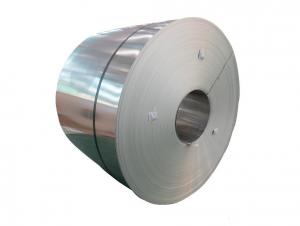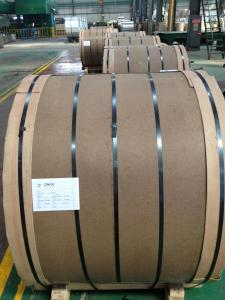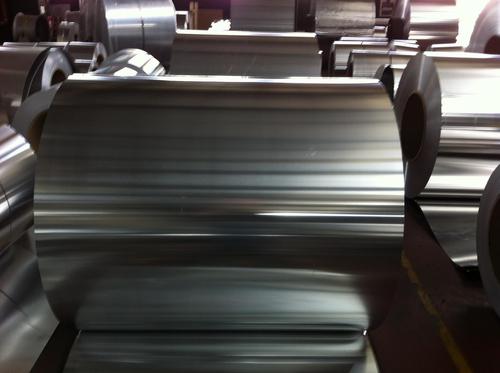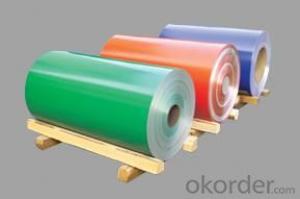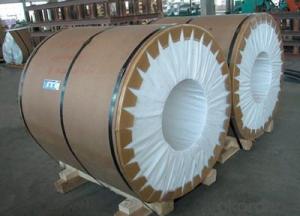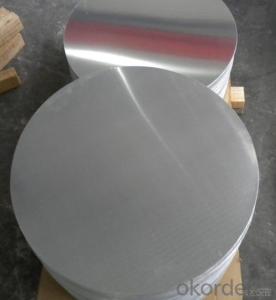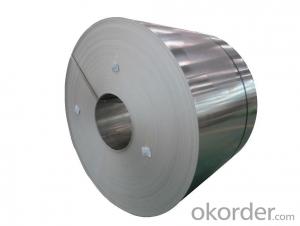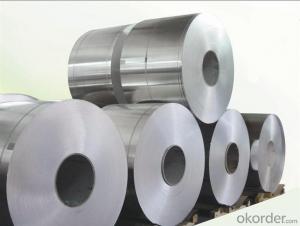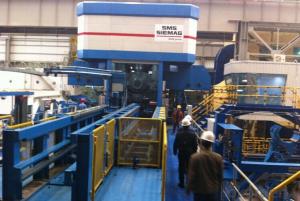Aluminum Coil - Direct Casting Aluminium Strip in Coil AA1100 Temper F
- Loading Port:
- China Main Port
- Payment Terms:
- TT or LC
- Min Order Qty:
- -
- Supply Capability:
- -
OKorder Service Pledge
OKorder Financial Service
You Might Also Like
1.Structure of Product Description
Direct Continuous Aluminium Strip in Coil is one semi-finished aluminium material. The Temper is F, it means Free Temper. This strip can be rolled down to aluminium coil,sheet,circle ect, especially aluminium coils and sheet. The alloy AA1100 is widly used in building, industry ect. Its weight is much lower than steel. So many customers choosed aluminium material instead of steel.
2. Main features of the product
a.Competitive price---We have our own mills and can produce mill finished aluminium coils, so we can control the production cost better.
b.Professional after-sale service---We have more than 15 years exportation experience and you need not worry about the exporation problems.
c.Fast delivery time---We can control the delivery time within 35 days.
3.Image
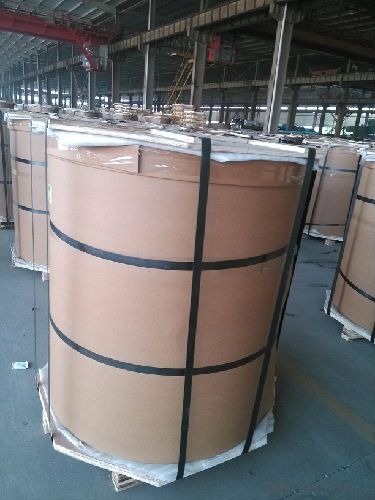
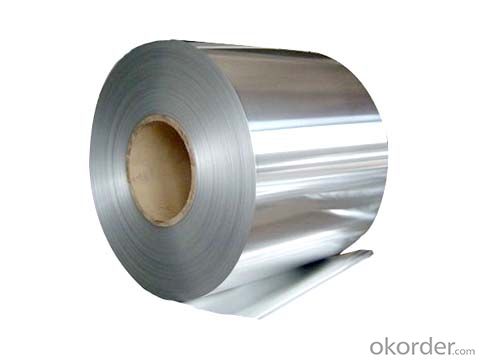
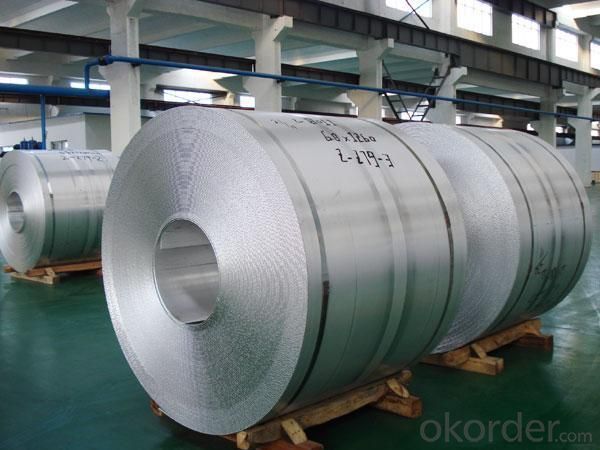
4. Products Specification
| Alloy | Temper | Final Usage | Coil ID | Coil Weight |
| AA1100 | F | Aluminium sheet, coil | 610mm | 5-6 tons |
5. FAQ
What is the quality standard?
---Usually our standard is GB3880-2006
What is the largest width?
---It is 2300mm
What is the MOQ?
---Usually we can accept 80 tons.
- Q: Are there any limitations on the width-to-thickness ratio of aluminum coils?
- Yes, there are limitations on the width-to-thickness ratio of aluminum coils. The width-to-thickness ratio is an important factor in determining the overall strength and performance of aluminum coils. If the ratio is too high, it can lead to issues such as buckling, warping, or even failure of the coil. The specific limitations on the width-to-thickness ratio depend on various factors such as the alloy composition, temper, and intended application of the aluminum coil. Different alloys and tempers have different mechanical properties and can handle different ratios. Additionally, the intended application of the coil, such as roofing, automotive, or packaging, may have specific requirements for the width-to-thickness ratio. Manufacturers typically provide guidelines and specifications for the acceptable width-to-thickness ratio based on their product offerings. These guidelines ensure that the coils are used within their intended capabilities and prevent any issues related to excessive width-to-thickness ratios. It is important for users and designers to consider these limitations and guidelines when selecting and utilizing aluminum coils. Failure to adhere to these limitations can result in compromised performance, increased risk of damage, and potential safety concerns. Therefore, it is crucial to consult the manufacturer's recommendations and industry standards to determine the appropriate width-to-thickness ratio for a given application.
- Q: Are aluminum coils resistant to oil and grease?
- Yes, aluminum coils are generally resistant to oil and grease. Aluminum has a natural resistance to corrosion and is not easily affected by most solvents, including oil and grease. This property makes aluminum coils a suitable choice for various applications where they may come into contact with oils or greases, such as in the automotive and HVAC industries. However, it is important to note that prolonged exposure to certain aggressive chemicals or high concentrations of oil or grease may still cause some damage or degradation to the aluminum coils over time. Therefore, it is recommended to properly clean and maintain the coils to ensure their optimal performance and longevity.
- Q: What are the main causes of aluminum strip rolling?
- Different thickness analysis is not the same, is curly after the thickness of the upper rib, or out of the roll can be visual?
- Q: Can aluminum coils be used in HVAC heat exchangers?
- Yes, aluminum coils can be used in HVAC heat exchangers. Aluminum is a popular choice for heat exchangers due to its excellent thermal conductivity, light weight, and corrosion resistance. Aluminum coils are often used in air conditioning systems and heat pumps, where they transfer heat efficiently between the refrigerant and the surrounding air. Additionally, aluminum coils are easier to shape and form, allowing for more intricate designs and better heat transfer performance. Overall, aluminum coils are a reliable and effective choice for HVAC heat exchangers.
- Q: Can aluminum coils be used for automotive heat shields?
- Yes, aluminum coils can be used for automotive heat shields. Aluminum is a lightweight and durable material that has excellent heat resistance properties, making it suitable for use in automotive heat shields. Its ability to dissipate heat efficiently helps protect sensitive components from excessive heat, ensuring optimal performance and durability in vehicles.
- Q: How are aluminum coils used in the production of industrial machinery?
- Aluminum coils are commonly used in the production of industrial machinery for various purposes. These coils are primarily utilized in the fabrication of heat exchangers, such as condensers and evaporators, due to aluminum's excellent thermal conductivity. Additionally, aluminum coils are used to manufacture air conditioning systems, refrigeration units, and cooling towers, as they offer lightweight and corrosion-resistant properties. They are also employed in the construction of electrical transformers and motors due to their high electrical conductivity. Overall, aluminum coils play a crucial role in the manufacturing of industrial machinery, contributing to enhanced efficiency, durability, and performance.
- Q: How are aluminum coils used in electrical applications?
- Aluminum coils are widely used in various electrical applications due to their advantageous properties. These coils are primarily used in transformers, motors, and inductors. In transformers, aluminum coils are used to transfer electrical energy from one circuit to another. The coils are wound around a magnetic core, which helps in the efficient transfer of energy. Aluminum coils are preferred over copper coils in transformers due to their lower cost, lightweight nature, and excellent conductivity. Additionally, aluminum coils have a higher thermal conductivity, allowing for better heat dissipation, which is crucial in maintaining the efficiency and longevity of transformers. In motors, aluminum coils are used as the winding material for the stator. The stator is the stationary part of the motor, and the coils generate a magnetic field when an electrical current is passed through them. This magnetic field interacts with the rotating magnetic field generated by the motor's rotor, resulting in the rotation of the motor. Aluminum coils are preferred in motors due to their lightweight nature, which reduces the overall weight of the motor, making it more efficient. Inductors are another electrical component that utilizes aluminum coils. Inductors store electrical energy in the form of a magnetic field. When current flows through the coil, a magnetic field is created, which resists changes in the current. Aluminum coils are used in inductors due to their high electrical conductivity, which allows for efficient energy storage and release. Overall, aluminum coils are extensively used in electrical applications due to their cost-effectiveness, lightweight nature, excellent conductivity, and high thermal conductivity. Their usage in transformers, motors, and inductors contributes to the efficient and reliable operation of electrical systems.
- Q: How do aluminum coils compare to other types of metal coils?
- Aluminum coils have several advantages and disadvantages when compared to other types of metal coils. One of the main advantages of aluminum coils is their lightweight nature. Aluminum is significantly lighter than other metals such as copper or steel, making it easier to handle and transport. This lightweight property also makes aluminum coils more cost-effective in terms of shipping and installation. Furthermore, aluminum coils are highly resistant to corrosion, which is a significant advantage in many applications, especially in humid or corrosive environments. This resistance to corrosion makes aluminum coils suitable for outdoor use, such as in air conditioning systems or refrigeration units. Additionally, aluminum coils have excellent thermal conductivity, allowing for efficient heat transfer. This property makes them highly efficient in heat exchange applications, such as in HVAC systems or automotive radiators. However, aluminum coils also have some drawbacks. Compared to copper coils, aluminum coils have lower electrical conductivity, which can result in higher energy consumption and reduced efficiency in certain applications. Additionally, aluminum is a softer metal than copper or steel, which means that aluminum coils may be more susceptible to damage or bending. In summary, aluminum coils offer advantages such as lightweight, corrosion resistance, and thermal conductivity. However, they may have lower electrical conductivity and be more prone to damage compared to other types of metal coils. The choice between aluminum coils and other types of metal coils ultimately depends on the specific application and its requirements.
- Q: What are the methods to prevent rust formation on steel coils during storage and transportation?
- <p>To prevent rust on steel coils during storage and transportation, follow these steps: 1. Keep the coils dry and avoid exposure to moisture. 2. Use rust inhibitors or anti-corrosion coatings on the coils. 3. Store the coils in a clean, dry, and well-ventilated area. 4. Use protective wrapping materials like plastic film or corrosion-resistant paper. 5. Ensure proper stacking and avoid direct contact between coils. 6. Use rust-resistant materials for transportation containers. 7. Regularly inspect the coils for signs of rust and address any issues promptly. By implementing these measures, you can significantly reduce the risk of rust formation on steel coils.</p>
- Q: What are the different coil packaging materials used for aluminum coils?
- There are several different coil packaging materials commonly used for aluminum coils. These materials are designed to protect the coils during transportation and storage, ensuring they arrive at their destination in good condition. One of the most popular coil packaging materials for aluminum coils is plastic. Plastic packaging can come in the form of shrink wrap, stretch film, or plastic bands. Shrink wrap is often used to tightly encase the coils, providing a secure and protective covering. Stretch film, on the other hand, is used to tightly wrap the coils together, preventing them from shifting and potentially causing damage. Plastic bands are used to secure the coils together, offering an additional layer of stability. Another commonly used packaging material for aluminum coils is paper. Kraft paper or corrugated cardboard is often used to wrap and protect the coils. This type of packaging provides cushioning and prevents the coils from scratching or rubbing against each other during transit. Paper packaging is also easily recyclable, making it an environmentally friendly option. In addition to plastic and paper, steel strapping is sometimes used to package aluminum coils. Steel strapping offers excellent strength and durability, ensuring that the coils remain securely bundled during transportation. This type of packaging material is particularly useful for heavy-duty applications where extra protection is needed. Overall, the choice of coil packaging material for aluminum coils depends on factors such as the size and weight of the coils, transportation requirements, and the level of protection needed. By using the right packaging materials, aluminum coils can be safeguarded against damage and arrive at their destination in optimal condition.
Send your message to us
Aluminum Coil - Direct Casting Aluminium Strip in Coil AA1100 Temper F
- Loading Port:
- China Main Port
- Payment Terms:
- TT or LC
- Min Order Qty:
- -
- Supply Capability:
- -
OKorder Service Pledge
OKorder Financial Service
Similar products
Hot products
Hot Searches
Related keywords

